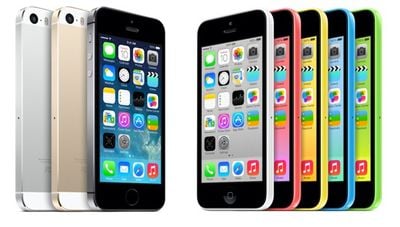U.S. House Approves Bill Making Smartphone Unlocking Legal, Obama Pledges to Sign it Into Law
We're one step closer to being able to legally unlock smartphones again, as the United States House of Representatives today passed legislation that legalizes cell phone unlocking, unanimously voting in favor of the Unlocking Consumer Choice and Wireless Competition Act.
The Act was approved by the Senate last week, which means the final step is presidential approval. Obama has long supported making cell phone unlocking legal again, and today pledged to sign the bill into law.

I applaud Members of Congress for passing the Unlocking Consumer Choice and Wireless Competition Act. Last year, in response to a "We the People" petition from consumers across our country, my Administration called for allowing Americans to use their phones or mobile devices on any network they choose. We laid out steps the FCC, industry, and Congress should take to ensure copyright law does not undermine wireless competition, and worked with wireless carriers to reach a voluntary agreement that helps restore this basic consumer freedom.
The bill Congress passed today is another step toward giving ordinary Americans more flexibility and choice, so that they can find a cell phone carrier that meets their needs and their budget. I commend Chairmen Leahy and Goodlatte, and Ranking Members Grassley and Conyers for their leadership on this important consumer issue and look forward to signing this bill into law.
The Unlocking Consumer Choice and Wireless Competition Act came about following a 2013 "We the People petition" that called for cell phone unlocking to be made legal. Cell phone unlocking first became illegal in January of 2013, after an exception in the Digital Millennium Copyright Act expired, restricting U.S. customers from shifting service to other carriers or using their devices abroad with local SIM cards.
Under the terms of the bill, consumers and third-party services will again be able to unlock cell phones and tablets without receiving express permission from carriers and without facing criminal penalties.
In December of 2013, U.S. cellular carriers and the FCC also came to an agreement over a set of voluntary principles that make it easier for wireless customers to unlock their devices and switch from carrier to carrier after a contract has been fulfilled.
Note: Due to the political nature of the discussion regarding this topic, the discussion thread is located in our Politics, Religion, Social Issues forum. All forum members and site visitors are welcome to read and follow the thread, but posting is limited to forum members with at least 100 posts.
Popular Stories
Apple today released iOS 18.4 and iPadOS 18.4, the fourth major updates to the iOS 18 and iPadOS 18 operating system updates that came out last year. iOS 18.4 and iPadOS 18.4 come two months after Apple released iOS 18.3 and iPadOS 18.3.
Subscribe to the MacRumors YouTube channel for more videos.
The new software can be downloaded on eligible iPhones and iPads over-the-air by going to...
iOS 19 will not be available on the iPhone XR, iPhone XS, or the iPhone XS Max, according a private account on social media site X that has accurately provided information on device compatibility in the past.
The iPhone XR, iPhone XS, and iPhone XS Max all have an A12 Bionic chip, so it looks like iOS 19 will discontinue support for that chip. All other iPhones that run iOS 18 are expected...
While the iPhone 17 Pro and iPhone 17 Pro Max are not expected to launch until September, there are already plenty of rumors about the devices.
Below, we recap key changes rumored for the iPhone 17 Pro models as of March 2025:
Aluminum frame: iPhone 17 Pro models are rumored to have an aluminum frame, whereas the iPhone 15 Pro and iPhone 16 Pro models have a titanium frame, and the iPhone ...
Apple today released new firmware updates for all AirPods 4 and AirPods Pro 2 models. The new firmware is version 7E93, up from the 7B21 firmware that was installed on the AirPods Pro 2 and the 7B20 firmware available on the AirPods 4 and AirPods 4 with ANC.
It is not immediately clear what new features or changes are included in the new firmware, but we'll update this article should we find ...
Apple's big developer event is a little over two months away, and rumors about what we can expect to see in Apple's next major operating system updates are becoming increasingly frequent.
A public release of iOS 18.4 is also imminent with a number of updates and improvements, although we won't be getting the major Apple Intelligence Siri upgrades that had reportedly been planned for this...
Multiple sources have claimed that iOS 19 will introduce a new design with more translucent buttons, menus, notification banners, and more, and there is now another clue that points towards this glass-like appearance.
Bloomberg's Mark Gurman today said the new design project is codenamed "Solarium" internally. A solarium is a room with glass walls that allow in plenty of sunlight, so this...
Apple today released macOS Sequoia 15.4, the fourth major update to the macOS Sequoia operating system that launched in September. macOS Sequoia 15.4 comes two months after the launch of macOS Sequoia 15.3.
Mac users can download the macOS Sequoia update through the Software Update section of System Settings. It is available for free on all Macs able to run macOS 15.
With...
Apple is reportedly working on a new Magic Mouse. Below, we recap what to expect.
The two key rumors for the Magic Mouse 3 so far include a relocated charging port, along with a more ergonomic design.
It was briefly rumored that the Magic Mouse 3 would also feature voice control, but that was misinterpreted information.
Relocated Charging Port
While the Magic Mouse switched from...























